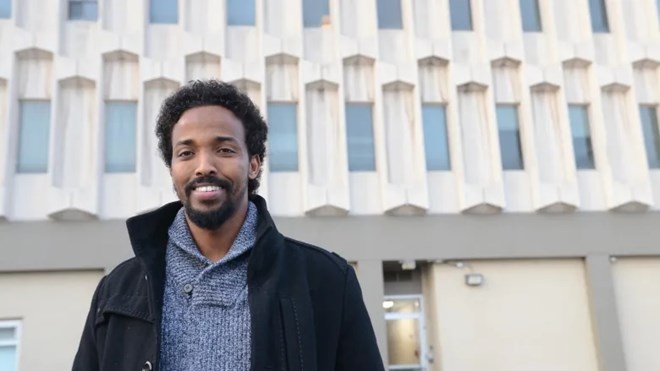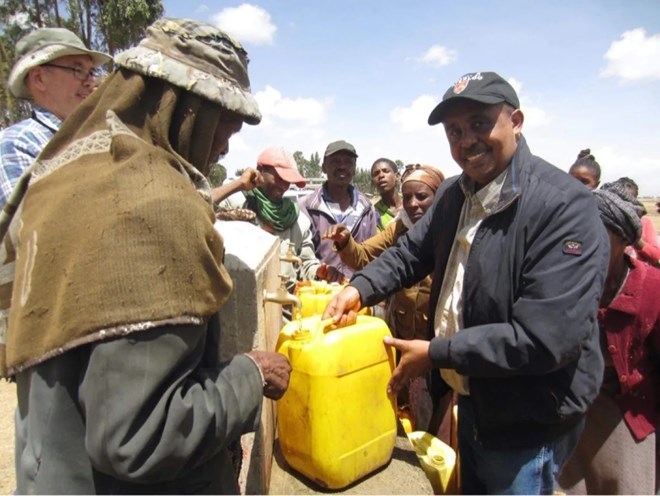
Tuesday December 20, 2022

Abdi Ibrahim is the vice president of the Somali Association of London Ontario. He sends upward of $1,000 per month to his family living in a refugee camp in Kenya. (Michelle Both/CBC)
Canadians with family living in parts of the world where poverty is a daily struggle are working extra jobs and pinching pennies to continue financially supporting their loved ones.
Abdi Ibrahim is one of those people trying to pay his own bills in London, Ont., while also sending $1,000 or more each month to his parents and four siblings who have been living in a refugee camp in Kenya since they fled Somalia's civil war in 1992.
"They depend on me," explained Ibrahim, 31, an employee at a local software company and the vice president of the Somali Association of London Ontario.
"The money I send them, it's what keeps them going. I know I have a responsibility," he said.
But as the cost of living has gone up, Ibrahim has had to take on extra jobs freelancing and tutoring in the evenings so the amount he sends won't be impacted.
Globally, food insecurity is "alarmingly high," with 193 million people facing severe food insecurity around the world, according to the Global Report on Food Crises 2022. Here in Canada, food prices jumped by 10.1 per cent this year, as inflation shot up 6.9 per cent.
"It is tough. It is very hard," Ibrahim said, of inflation. "But I know that however hard life is here, they have it worse."
It's a feeling shared by Dagim Almaw, who is also struggling to send money to his uncle and cousins in Ethiopia. Their farm and animals were destroyed when Ethiopia's Tigray war spilled into the Amhara region.
"Every time, from savings on groceries, we collect and we send," said Almaw, who tries to send $300 every few months. "Most of the time we don't buy expensive stuff. Our families are expecting from us. Because if we don't support them, they won't have any money from anywhere."
Almaw also founded Hope H20, a London volunteer-run charity funding water and sanitation projects in Ethiopia. Like other NGOs, fundraising for projects is equally challenging as Canadians find themselves strapped for extra money.
'We're doing what we can'
Mekoya Wondrad works as a fundraiser in London, supporting the local Ethiopian community association. He says the pandemic affected in-person events and now, the cost of living in Canada has made the work even harder.
"We're struggling but we are sharing what we have. The price increase has affected us greatly, but the point is, we're doing what we can," Wondrad said.

Dagim Almaw, left, says his uncle and cousins now live in a shelter after their farm was destroyed in the civil war in Ethiopia. 'If we don't support them, they won't have any money from anywhere,' he says. (Submitted by Hope H20)
He visited Ethiopia in October and saw the desperation people displaced by war are facing, describing it as a "humanitarian catastrophe." More than 5 million people were internally displaced in Ethiopia in 2021, according to a report from the Internal Displacement Monitoring Centre.
Even small amounts have a big impact
Mikyla Pragashpathy sees first hand the number of people who consider it an obligation to send money home, calling it a privilege that can come with living in Canada.
She's the basic needs co-ordinator at LUSO Community Services, a multicultural community organization in northeast London, which also provides food to local families.
"Cost of living increases have made it challenging for the average family to cover costs, let alone someone who's trying to support others abroad," Pragashpathy said. She notes that a lot of clients at LUSO are working multiple jobs to pay their bills in Canada and support family members.
But even small amounts of money can have a big impact. Once it's exchanged, Pragashpathy said, the money goes a lot further.
"They are suffering. A lot of people don't even have food to eat. All they have is destroyed by war," Almaw explains. "They need help from us."